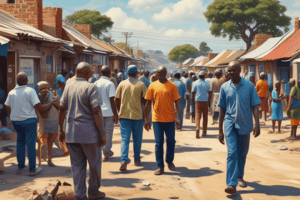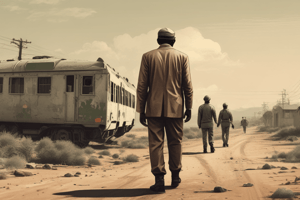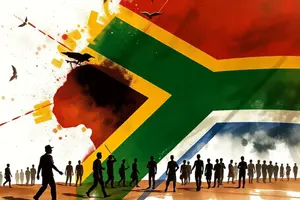Podcast
Questions and Answers
Which statement best describes the role of citizens in electing a government?
Which statement best describes the role of citizens in electing a government?
- The military selects the government based on national security interests.
- Citizens participate in elections to choose their government representatives. (correct)
- Citizens are appointed by the outgoing government to ensure a smooth transition.
- Government positions are hereditary and passed down through families.
Which location serves as the primary seat of government in South Africa, where Parliament is located?
Which location serves as the primary seat of government in South Africa, where Parliament is located?
- Pretoria
- Johannesburg
- Bloemfontein
- Cape Town (correct)
Which of the following is the MOST accurate description of how government interacts with households?
Which of the following is the MOST accurate description of how government interacts with households?
- Households are solely responsible for providing public services, while the government focuses on international relations.
- The government and households operate independently with no interaction.
- The government provides essential services to households and regulates their economic activities. (correct)
- Households dictate government policy through direct control of tax revenue.
How does the government's provision of infrastructure MOST directly benefit businesses?
How does the government's provision of infrastructure MOST directly benefit businesses?
Which of the following BEST describes the role of the judicial branch within the national government?
Which of the following BEST describes the role of the judicial branch within the national government?
Which of the following is MOST likely a responsibility of the local government?
Which of the following is MOST likely a responsibility of the local government?
A new law is proposed relating to environmental regulations. Which branch of the National Assembly is PRIMARILY responsible for creating this law?
A new law is proposed relating to environmental regulations. Which branch of the National Assembly is PRIMARILY responsible for creating this law?
The government decides to increase funding for public schools in rural areas. Which objective of the government does this action MOST directly support?
The government decides to increase funding for public schools in rural areas. Which objective of the government does this action MOST directly support?
Flashcards
Government
Government
A group of people who set policies and laws to control how a country operates.
Election of Government
Election of Government
Citizens elect the government through a voting process.
Current President of South Africa
Current President of South Africa
Cyril Ramaphosa
Seat of Government and President's Office
Seat of Government and President's Office
Signup and view all the flashcards
Function of Government
Function of Government
Signup and view all the flashcards
Three Levels of Government
Three Levels of Government
Signup and view all the flashcards
Three Branches of National Assembly
Three Branches of National Assembly
Signup and view all the flashcards
South Africa is not a democracy
South Africa is not a democracy
Signup and view all the flashcards
Study Notes
- Government is a group of people setting policies and making laws to control a country’s operation.
- Democracy is a system where all citizens can vote for their representatives in Parliament.
- The State is an organized community run by the government.
Responsibilities of Government
- Maintaining order, ensuring citizens obey the law.
- Providing enough funding for infrastructure like schools, hospitals, policing, and electricity
- Ensuring efficient state operations.
- Providing services and infrastructure to support economic growth
Levels of Government
- National Government: Rules over South Africa
- Provincial Government: Rules over a province
- Local Government: Rules over a district, town, or city.
National Government
- Consists of the National Assembly and the National Council of Provinces.
National Assembly
- Has three branches:
- Legislative: Makes the laws.
- Executive: Leads the country, consisting of the President and Ministers.
- Judicial: Ensures laws are followed via the Supreme Court and High Court.
Services Provided by the National Government
- Education
- Hospitals
- Sports and recreation facilities
- Ensures fair labor laws
- Promotes arts and culture
- Ensures that women, youth, children, and people with disabilities can function to their full capacity in society
- Ensures the safety of citizens and businesses (defense force, police, and correctional services).
Provincial Government
- Led by a Premier.
- Each has its own legislative branch.
- Follows national laws
- Reports back to the National Council of Provinces (NCOP).
Services Provided by Provincial Governments
- Water, sanitation, and electricity.
- Health care services: provincial hospitals and clinics.
- Educational services: building schools, providing teachers, textbooks, and stationery.
- Construction and maintenance of provincial roads.
Local Government
- Provinces are divided into municipalities.
- Accountable to the provincial government.
- Ensures the provision of services such as water, electricity, transport, hospitals, police (SAPS), and education.
- Promotes social and economic development.
Services Provided by Local Government
- Construction and maintenance of local roads.
- Controlling traffic
- Clinics
- Libraries
- Sewage
- Water and electricity to local communities.
- Transport facilities.
Households
- Producers: They "sell" their labor to businesses.
- Consumers: They buy goods and services.
Businesses
- Producers: They produce goods and services.
- Consumers: They buy labor from households.
Role-Players
- Government
- Households (citizens of a country; owners of the factors of production)
- Businesses
The Roles of Government as Producer and Consumer
- The government is a consumer as it purchases labor, goods, and pays for services by members of households.
- It also produces electricity, builds hospitals, police stations, and courts for households.
- Households provide labor and capital to the government, consume electricity and water, and use infrastructure like roads.
- To function optimally, the government needs workers (provided by households) to assist with implementing decisions, laws, and policies.
- The government is a consumer of labor, and households are the producers of labor.
- The government pays salaries/wages to households in exchange for labor.
- The workers (households) then spend their income to buy goods and services like food, water, and electricity.
When municipality electricity is bought
- The government becomes the producer, and the household becomes the consumer.
- The government also needs goods and services like stationery, insurance, cellphones, and cellphone contracts, provided by the private sector.
- The government is the consumer, and the business is the producer when the government uses goods and services provided by the private sector.
- The money the government pays to businesses is then used to buy goods and services, leading to an endless cycle.
Additional information
- The people of the country elect the government.
- The current president of South Africa is Cyril Ramaphosa.
- The seat of government and the office of the president are in Parliament Cape Town and Union House Pretoria.
- One function of the government is providing infrastructure (railway, electricity, roads, water).
- Three objectives of the government include promoting art and culture, providing education, and providing hospitals.
- The three levels of government: National, Provincial and Local.
- The three branches of the National Assembly are Legislative, Executive and Judicial.
- Alan Winde is the Premier of the Western Cape
- Geordin Hill-Lewis is the Mayor of the Western Cape
Studying That Suits You
Use AI to generate personalized quizzes and flashcards to suit your learning preferences.




